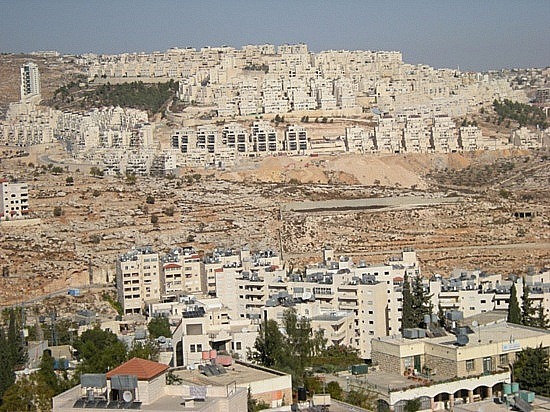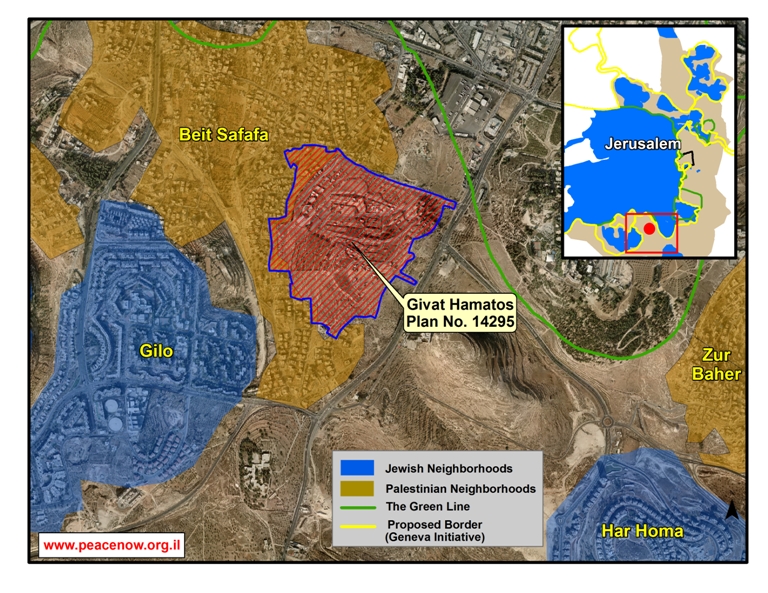Israel approves plan for 2,600 new homes in East Jerusal
 Sunday, December 23, 2012 at 05:14PM
Sunday, December 23, 2012 at 05:14PM Nir Hasson 19 December 2012 Haaretz

Jerusalem’s illegal Har-Homa neighborhood
Committee green-lights construction in new neighborhood in Givat Hamatos, despite severe international criticism over project announced earlier this week for Ramat Shlomo
The Jerusalem District Planning and Building Committee on Wednesday approved a large construction project which will see the creation of a new Jewish neighborhood in the south of the city, over the Green Line.
More than 2,600 housing units are slated to be built in the new Givat Hamatos neighborhood, the site of mobile homes that had been used to house Ethiopian immigrants.
That site is near Har Homa, which was controversial when Benjamin Netanyahu approved its construction in 1997 during his first term as prime minister. Although the area is in the south of the city, it is considered East Jerusalem as it is over the Green Line.
The committee was scheduled Tuesday to debate another project for 900 new homes in the same area, but the deliberations were postponed.
On Tuesday, the committee also approved a plan to construct hundreds of homes for Arab residents of Beit Safafa in Jerusalem. Palestinian and left-wing Israeli activists claim that the aim of that project is to meld the Arab area into a Jewish neighborhood, and thus make it more difficult to divide the city in the future.
Approval for the Givat Hamatos project comes just two days after a sub-panel of the committee gave its preliminary go-ahead to a plan to build 1,500 housing units in the East Jerusalem neighborhood of Ramat Shlomo.

Both announcements were made just two weeks after Israel declared its intention to construct 3,000 new residential units in East Jerusalem and the West Bank, raising the ire of the international community.
The plan for the expansion of Ramat Shlomo was approved in March 2010, during a visit by U.S. Vice President Joe Biden. The approval sparked an unprecedented diplomatic crisis between Washington and Jerusalem, as a result of which the plan, along with additional construction projects in East Jerusalem, was suspended.
Israel then expedited the process as a retaliatory measure in the wake of the United Nations decision last month to accept Palestine as a non-member observer state, and announced its plans for building the additional 3,000 homes in various settlements. In the wake of the UN vote, Israel also planned to advance a long-frozen project for the E-1 area, which covers an area that links the city of Jerusalem with the settlement of Ma’aleh Adumim.
In an unusually rare and blunt criticism of its top Mideast ally, the State Department on Tuesday accused Israel of engaging in a “pattern of provocative action” that runs counter to statements from Israeli leaders that they are committed to peace.
“We are deeply disappointed that Israel insists on continuing this pattern of provocative action,” State Department Spokeswoman Victoria Nuland said. “These repeated announcements and plans of new construction run counter to the cause of peace. Israel’s leaders continually say that they support a path towards a two-state solution, yet these actions only put that goal further at risk.”
The tough comments came after Prime Minister Benjamin Netanyahu vowed to continue construction in East Jerusalem, in response to the international criticism.
Earlier on Tuesday, the European Union members of the UN Security Council – Britain, France, Germany and Portugal – were expected to issue a joint statement condemning the Israeli government’s decision to expand construction
An official in the Prime Minister’s Office clarified Monday that the decision to build in Ramat Shlomo did not represent new construction plans, but was rather a new stage in an existing project.
“These are not new homes,” the official said. “The intention to build them was publicized years ago, and what happened today was just a discussion on objections to the plan. This is just another planning stage, not the beginning of construction.”
 APJP |
APJP |  Post a Comment |
Post a Comment |